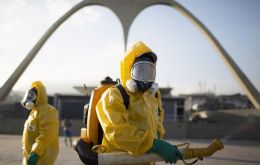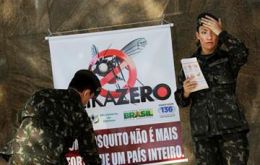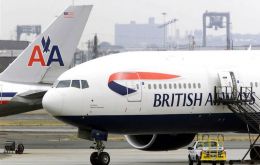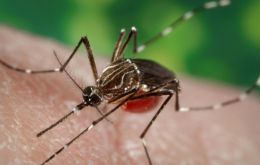MercoPress. South Atlantic News Agency
Tag: Brazil Zika virus
-
Sunday, May 29th 2016 - 14:28 UTC
World health experts call for Rio Olympics to be postponed or moved given Zika spread fears

More than 100 health experts have called for the Rio Olympic Games to be postponed or moved because of fears that the event could speed up the spread of the Zika virus around the world, according to a public letter published online.
-
Saturday, May 28th 2016 - 07:27 UTC
WHO public health advice regarding the Olympics and Zika virus

Based on current assessment, cancelling or changing the location of the 2016 Olympics will not significantly alter the international spread of Zika virus. Brazil is one of almost 60 countries and territories which to-date report continuing transmission of Zika by mosquitoes. People continue to travel between these countries and territories for a variety of reasons. The best way to reduce risk of disease is to follow public health travel advice.
-
Monday, May 23rd 2016 - 10:50 UTC
New recommendations for athletes and visitors of the coming Rio Olympic Games

Australian athletes at this summer’s Rio Olympics will be supplied with condoms which offer “near complete” protection against the mosquito-borne Zika virus, the Australian Olympic Committee (AOC) announced. However, the virus has been linked to a birth defect that causes babies to be born with unusually small heads.
-
Wednesday, March 9th 2016 - 05:08 UTC
Sambo fish to combat mosquitoes in the upcoming Olympic Games in Rio

Governments have been using various tools to fight the spread of the Zika virus in Latin America: fumigation, spraying of insecticides and even a plan to distribute mosquito repellents to athletes during the upcoming Summer Olympic Games in Rio de Janeiro, Brazil.
-
Tuesday, February 16th 2016 - 07:55 UTC
President Rousseff with 200.000 troops leads the “Zika Zero” campaign

More than 200,000 troops fanned out across Brazil over the weekend to raise awareness about the mosquito that spreads the Zika virus, which has been linked to a surge in birth defects.
-
Tuesday, February 16th 2016 - 07:43 UTC
Brazil will hold Olympic Games despite Zika, says president Rousseff

Brazilian President Dilma Rousseff said that the 2016 Olympic Games in Rio de Janeiro would take place despite the Zika virus, at a time when various athletes have expressed their fears about competing.
-
Friday, February 5th 2016 - 07:41 UTC
Brazil: health workers can enter private properties to crush Zika breeding grounds

Brazilian president Dilma Rousseff implemented a nationwide mandate this week allowing government health workers to enter private properties to crush Zika breeding grounds. Exterminators now have the right to inspect and disinfect households, even without the presence of its owners.
-
Friday, January 29th 2016 - 03:45 UTC
WHO admits as possible four million cases of Zika; emergency meeting Monday

The World Health Organization (WHO) expects the Zika virus, which is spreading through the Americas, to affect between three million and four million people, a disease expert said on Thursday. WHO's director-general said the spread of the mosquito-borne disease had gone from a mild threat to one of alarming proportions.
-
Thursday, January 28th 2016 - 05:50 UTC
Airlines offering refunds to passengers booked to fly to countries with Zika cases

Some airlines, including those serving the Caribbean, have started offering refunds to passengers who had been booked to fly to countries where cases of the Zika virus have been confirmed. United Airlines, American Airlines and British Airways are allowing passengers to back out of travel.
-
Tuesday, January 26th 2016 - 08:06 UTC
Pan American Health Organization statement on Zika virus transmission and prevention

Zika is a mosquito-borne virus that is new to the Americas. Since Brazil reported the first cases of local transmission of the virus in May 2015, it has spread to 21 countries and territories* of the Americas (as of 23 January 2016).
